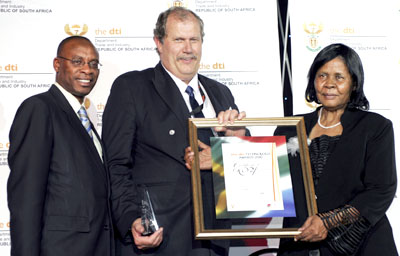Latest News Archive
Please select Category, Year, and then Month to display items
19 November 2018
|
Story Charlene Stanley
|
Photo Charlene Stanley
 Prof John Mubangizi, Dean of the Faculty of Law, encouraged delegates at the Fifth Annual International Mercantile Conference to share ideas on best international practice in their various fields.
Prof John Mubangizi, Dean of the Faculty of Law, encouraged delegates at the Fifth Annual International Mercantile Conference to share ideas on best international practice in their various fields.
“Don’t say anything online that you wouldn’t want plastered on a billboard with your face on it.”
This famous quote by international tech expert Erin Bury should be a guiding light when it comes to online habits in the workplace, according to Francois Cilliers, UFS Lecturer in Mercantile Law.
In his presentation Could Social Media be the Gateway to Employment Discrimination? he warned that employees have a responsibility not to bring their employers in disrepute through their comments on social media.
“Posts, updates, tweets, and comments are considered to be publications and can therefore never be seen as privileged information,” he explained.
Responsibility on employees and employers alike
He pointed out that employers also had a responsibility regarding the way in which they use the information about prospective employees obtained via social media.
“Nowadays, approximately 75% of companies hire through social media. In the US, recruiting companies spend hours researching candidates, making full use of what they can find on social media. It was found that 50–80% of employers frowned upon posts and pictures featuring drug and alcohol abuse, profanity, and bad grammar.”
He warned that employers needed to tread lightly, as a decision not to employ someone as a result of information on the prospective employee’s political views and sexual orientation could constitute unfair discrimination as set out in the Employment Equity Act.
“An employer who wishes to use a screening process (utilising social media) has to prove that the information and the process is objectively necessary and can be justified with reference to the inherent requirements of the job,” he explained.
“As technology and electronic systems advance, so too should the applicable labour laws.”
Cilliers’ presentation formed part of the Fifth Annual International Mercantile Law Conference recently hosted by the Faculty of Law on the Bloemfontein Campus.
Incorporating new technology in teaching and research
“This conference is an opportunity to share ideas on best practice in what is perceived as a ‘difficult’ field within Law,” said Prof John Mubangizi, Dean of the Faculty of Law, as he opened the proceedings. Topics in the discussion sessions ranged from Racism in the workplace and The underrepresentation of females in the judiciary, to Decriminalisation of cannabis: A recipe for healthy employer-employee relations?
“Conferences such as these help us to take advantage of the newest developments in technology to advance our teaching and research,” said Prof Mubangizi.
“To quote Einstein: ‘We can’t solve problems by using the same kind of thinking we used when we created them.’”
UFS Chemistry wins dti award
2010-11-02
 |
|
At the awards ceremony are, from the left: Director-General of Trade and Industry Mr Tshediso Matona, Prof. Andreas Roodt and the Deputy-Minister of Trade and Industry, Ms Bongi Maria Ntuli.
Photo: S Osman
|
The research group of Prof. Andreas Roodt, Head of the Department of Chemistry at the University of the Free State (UFS) in Bloemfontein, won the first prize in the category Development of Small Medium and Micro-Enterprises (SMME) at the annual Department of Trade and Industry’s (dti) award ceremony.
Prof. Roodt received the prize for the high-technology project Development of novel nuclear pharmaceuticals in the Technology and Human Resources for Industry Programme (THRIP).
The Deputy-Minister of Trade and Industry Bongi Maria Ntuli, and Director-General Tshediso Matona presented the prize at the gala dinner held at Gallagher Estate, Gauteng in October 2010.
The dti’s Annual Technology Awards recognise excellence in research and aim to raise awareness on the benefits of using technology to improve the competitiveness of enterprises, within the local and global arena. Individuals and organisations are recognised for their efforts in advancing and promoting technology interests and emerging enterprises.
The technology awards cover the achievements of three of the dti technology programmes collectively, namely THRIP, managed by the National Research Foundation (NRF); the Support Programme for Industrial Innovation (SPII) managed by the Industrial Development Corporation (IDC); and the Small Enterprise Development Agency (seda) Technology Programme (stp).
Prof. Roodt, also vice-president of the European Crystallographic Association, who has just returned from a series of lectures abroad after being elected Fellow of the Royal Society of Chemistry in the UK, has received funding in excess of R3 million over the past two years to set up a specialised laboratory for synthesising active compounds. Key partners in this project are Dr Gerdus Kemp from PETLabs Pharmaceuticals in Pretoria; Prof. Connie Medlen (pharmacologist), recently appointed affiliate professor at UFS Chemistry; as well as Prof. Deon Visser from the Inorganic Chemistry research group at the UFS.
The research aims to produce new nuclear medicinal agents for the early diagnosis of cancer, heart and brain defects, and even HIV/ Aids.
Two doctoral students, Alice Brink and Marietjie Schutte, are currently actively involved in this project. They are the recipients of prestige scholarships introduced by the UFS Rector and Vice-Chancellor, Prof. Jonathan Jansen, under the UFS Research Initiative (the Advanced Biomolecular Systems Cluster) to complete their Ph.D. studies.
Media Release
Issued by: Lacea Loader
Director: Strategic Communication (actg)
Tel: 051 401 2584
Cell: 083 645 2454
E-mail: loaderl@ufs.ac.za
2 November 2010